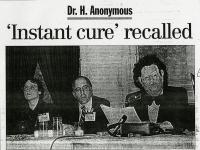Dr. John Fryer was a psychiatrist who met various forms of opposition throughout his career due to his homosexuality. He joined the medical faculty at Temple University in 1967 and taught psychiatry, all the while hiding his true identity as a gay man. At this time being homosexual was still considered a mental illness. In 1972, Fryer contested this by making a speech at the American Psychological Association meeting. Listed as “Dr. H. Anonymous,” he spoke through a microphone that distorted his voice while wearing a mask, wig, and baggy clothes. The length he went through to hide his identity shows how difficult and brave it was for him to make his speech. His speech discusses how psychiatrists have the ability to help rather than judge their gay patients and the positive effects this action could produce in society in general.
This lesson takes students through the speech of Dr. Henry Anonymous. Teachers using this speech should read it beforehand as it does contain words non-suitable for younger students and needs to be used at the discretion of the teacher. The transcription section contains a transcription with the inappropriate words and another version without.



